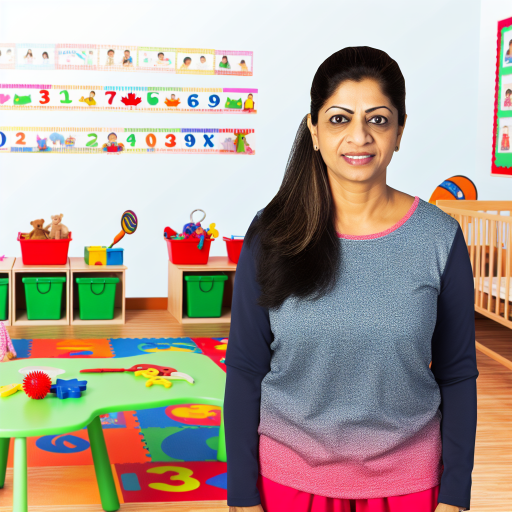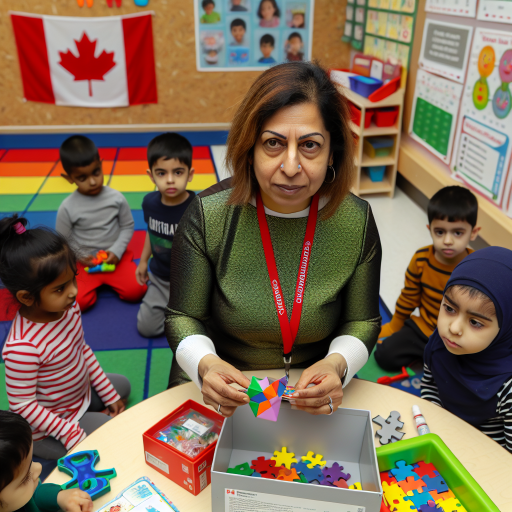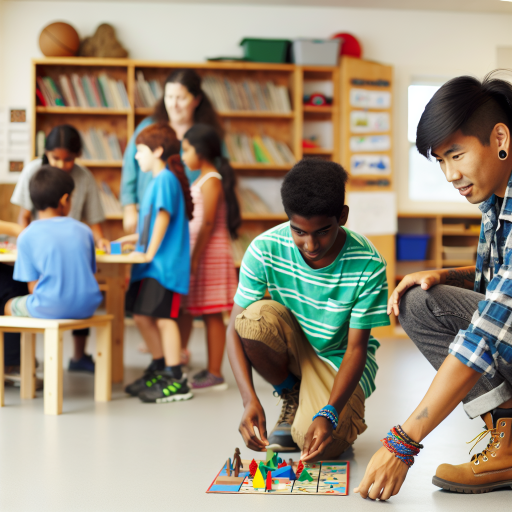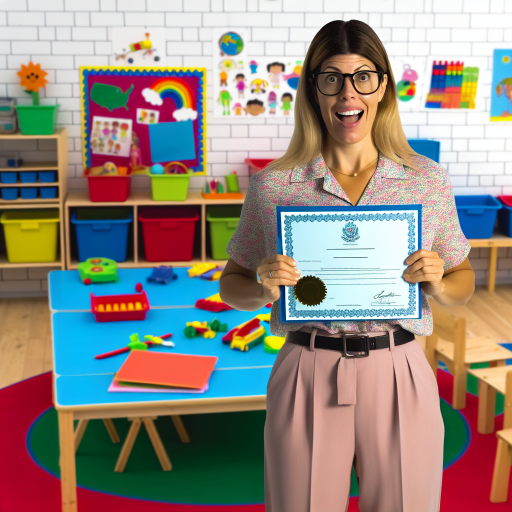Overview of Early Childhood Education
Definitions of Early Childhood Education
Early childhood education refers to the period of learning prior to formal schooling.
This phase typically includes children from birth to around eight years old.
It encompasses various educational settings, including daycare and preschool.
Moreover, it aims to foster the cognitive, emotional, and social development of young learners.
Goals of Early Childhood Education
The primary goal is to promote holistic development in children.
This includes enhancing language, motor skills, and self-regulation.
Furthermore, early childhood education encourages social interactions and emotional understanding.
It also prepares children for the academic rigors of elementary school.
In addition, it aims to build a strong foundation for lifelong learning.
Importance of Early Childhood Education
Early experiences significantly impact a child’s future learning and behavior.
Research shows that quality early education leads to better academic outcomes.
Additionally, it fosters critical thinking and problem-solving skills.
In many cases, this early start helps bridge achievement gaps.
Ultimately, effective early childhood education sets the stage for lifelong success.
Differences between Daycare and Preschool: Structure and Learning Environment
Overview of Daycare Environments
Daycares provide a safe space for children ages six weeks to twelve years.
They often focus on supervision and basic engagement.
Unexpectedly, daycares also promote socialization among peers.
Children can play, interact, and develop crucial skills.
However, educational components may vary significantly.
Overview of Preschool Environments
Preschools aim for structured learning for ages three to five.
They emphasize early childhood education and skill development.
Curricula in preschools often integrate play-based learning.
This encourages creativity and cognitive growth.
Additionally, preschool environments prepare children for kindergarten.
Key Structural Differences
Daycares typically offer flexible schedules and extended hours.
Unlock Your Career Potential
Visualize a clear path to success with our tailored Career Consulting service. Personalized insights in just 1-3 days.
Get StartedParents appreciate this convenience for work commitments.
In contrast, preschools usually maintain fixed school hours.
Preschools create routines that mimic a school environment.
This structure helps children adapt to future academic settings.
Learning Environment Comparisons
Daycare environments lean towards less formal education.
They prioritize safety and basic care needs of children.
Activity selection may focus on free play and exploration.
On the other hand, preschools employ targeted learning activities.
This includes structured lessons in literacy and numeracy.
Social Interaction Dynamics
Daycare settings often include mixed-age groups interestingly.
This facilitates peer learning among younger and older children.
Preschools mainly group children by age.
This allows for more tailored activities to specific developmental stages.
Both settings foster important social skills through interactions.
Role of Early Childhood Educators in Daycare
Responsibilities of Early Childhood Educators
Early childhood educators in daycare play a crucial role in child development.
They create a safe and nurturing environment for children.
In addition, they plan and implement engaging activities.
These activities support social, emotional, and cognitive growth.
Furthermore, educators must communicate effectively with parents.
This communication builds trust and ensures a collaborative approach.
Additionally, they observe children and assess their needs.
Such assessments help in individualizing care and education.
Essential Skills for Daycare Educators
Effective daycare educators possess a range of essential skills.
Communication skills are vital for interacting with children and parents.
Patience is another key attribute that fosters a positive learning environment.
Moreover, creativity allows educators to design engaging learning experiences.
Strong organizational skills assist in maintaining a structured environment.
Lastly, empathy enables educators to understand children’s emotions and needs.
Importance of Early Childhood Education
Supporting Developmental Milestones
Early childhood education supports critical developmental milestones.
It lays the groundwork for future learning and social interactions.
Educators guide children through essential skills, such as sharing and cooperation.
This foundation helps children navigate their environment effectively.
Building Lifelong Relationships
Daycare educators establish bonds that can last a lifetime.
These relationships provide children with security and comfort.
Additionally, strong connections with educators enhance children’s confidence.
They feel valued and understood, promoting a love for learning.
Explore Further: Best Practices for Early Childhood Educator Professional Growth
Role of Early Childhood Educators in Preschool
Focus on Curriculum Development
Early childhood educators play a crucial role in developing curriculum.
The curriculum should focus on the holistic development of children.
It encompasses cognitive, social, emotional, and physical growth.
Additionally, educators tailor the curriculum to meet diverse needs.
Such customization ensures inclusivity and accessibility in learning.
Facilitating Learning Experiences
Educators create engaging learning experiences for preschoolers.
These experiences should be interactive and hands-on.
By using play-based activities, children learn essential skills.
Moreover, educators assess children’s progress regularly.
This assessment guides future lesson planning and curriculum adjustments.
Supporting Social and Emotional Development
Social and emotional development is vital in early childhood education.
Educators foster an environment of trust and respect.
They teach children to express their emotions appropriately.
Additionally, educators encourage cooperative play among peers.
This collaboration nurtures social skills and relationship building.
Collaboration with Families
Effective communication with families enhances preschool education.
Educators engage with parents about their child’s progress.
This partnership fosters a support system for children.
It also encourages parents to be active participants in learning.
Regular updates create a positive connection between home and school.
Continuous Professional Development
Staying current in educational practices is essential for educators.
They should engage in ongoing professional development opportunities.
Workshops and conferences provide new teaching strategies.
Additionally, educators share insights and experiences with peers.
This collaboration further enhances the quality of preschool education.
Gain More Insights: Careers in Special Education: How Canada Supports Diverse Learning Needs
Regulatory Standards for Daycare vs Preschool: Licensing and Accreditation
Understanding Licensing Requirements
Daycare centers require specific licenses to operate legally.
They must adhere to local and state regulations.
These regulations often focus on safety and health standards.
Preschools also need licenses, though requirements may differ.
Some states impose additional educational mandates for preschool licenses.
It’s essential for directors to understand these nuances.
Accreditation Distinctions
Many daycare facilities seek accreditation to boost credibility.
Organizations like the National Association for the Education of Young Children (NAEYC) offer accreditation options.
This recognition often enhances trust among parents.
Preschools commonly pursue similar accreditation for further validation.
Furthermore, accredited preschools usually maintain higher educational standards.
In both cases, accreditation signifies adherence to quality benchmarks.
Impact on Educators
Regulatory standards shape curriculum development in both settings.
Daycare educators may focus more on care and supervision.
Conversely, preschool educators emphasize structured learning activities.
These roles require different skill sets and training qualifications.
Ongoing professional development is essential for both educators.
Understanding regulatory frameworks is crucial for educators.
Uncover the Details: From Classrooms to Screens: How EdTech is Shaping Canadian Education Careers
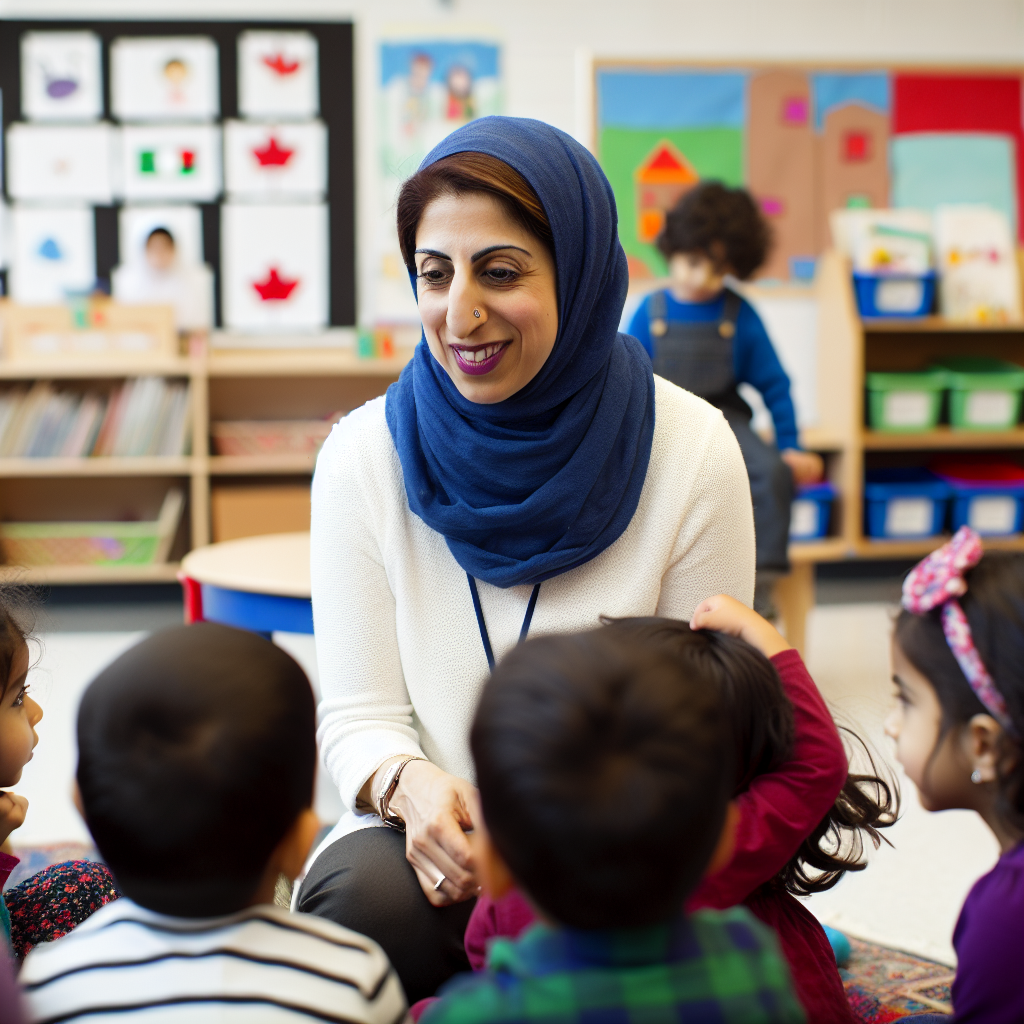
Impact of Daycare and Preschool on Child Development
Social Development
Social interactions at daycare and preschool significantly boost children’s social skills.
Children learn to share and cooperate with their peers through play.
Additionally, they develop empathy by understanding others’ feelings.
Group activities encourage teamwork, enhancing communication abilities.
Teachers guide children in resolving conflicts, fostering conflict-resolution skills.
Emotional Growth
Early childhood education settings create safe spaces for emotional expression.
Children learn to identify and manage their emotions effectively.
Personal interactions help them build self-esteem and confidence.
Being part of a group aids in developing a sense of belonging.
These experiences promote emotional resilience throughout their lives.
Cognitive Development
Both daycare and preschool provide rich environments for cognitive development.
Children engage in activities that stimulate critical thinking and problem-solving skills.
Hands-on learning encourages curiosity and exploration in young minds.
Structured educational activities promote literacy and numeracy skills.
Consequently, children develop a foundational understanding of their world.
Discover More: How Digital Learning Is Creating New Career Opportunities in Canada’s Education Sector
Collaboration with Families: Communication Strategies in Daycare and Preschool Settings
Importance of Communication
Effective communication fosters trust between educators and families.
It enhances the learning experience for children in both daycare and preschool settings.
Furthermore, clear communication helps address concerns promptly.
Creating Open Lines of Communication
Early childhood educators should establish regular communication with families.
Using various channels can strengthen the connection.
Methods include phone calls, emails, and newsletters.
Strategies for Daycare Settings
In daycare, daily reports offer valuable insights to parents.
These reports summarize the child’s activities and milestones.
Additionally, parent-teacher conferences can enhance collaboration.
Strategies for Preschool Settings
Preschool teachers can use learning portfolios to communicate progress.
These portfolios showcase children’s work and growth over time.
Storytelling events also facilitate family engagement.
Using Technology for Communication
Technology can facilitate seamless communication between parents and educators.
Apps and platforms allow for instant updates and notifications.
For instance, platforms like ClassDojo keep parents informed consistently.
Encouraging Feedback from Families
Encouraging constructive feedback creates a collaborative environment.
Surveys and suggestion boxes can gather valuable insights from parents.
This input helps improve programs and meet family needs effectively.
Building Community Connections
Both daycare and preschool programs should involve the local community.
Partnerships with local organizations can enhance educational experiences.
For example, field trips to community centers promote engagement.
Addressing Cultural Sensitivity
Cultural sensitivity plays a crucial role in communication strategies.
Educators should respect and celebrate diverse backgrounds.
This practice helps in involving families from all walks of life.
Strengthening Relationships
Ultimately, strong relationships lead to better outcomes for children.
When families feel valued, engagement increases dramatically.
Moreover, children thrive in supportive and connected environments.
Career Pathways for Educators
Qualifications for Early Childhood Educators
Early childhood educators require specific educational credentials.
A degree in early childhood education often serves as a foundational qualification.
In many regions, an associate’s or bachelor’s degree is preferred.
Furthermore, certifications such as Child Development Associate (CDA) are valuable.
These qualifications enhance professional credibility and competencies.
Gaining knowledge in child psychology also proves beneficial.
Professional Development Opportunities
Continuing education keeps educators updated with best practices.
Workshops can provide practical skills and innovative teaching techniques.
Online courses offer flexibility and a broad range of topics.
Networking events can help educators connect with peers.
Joining professional organizations also provides access to resources.
Additionally, mentorship programs foster growth and development.
Career Advancement Strategies
Educators should pursue leadership roles within their institutions.
Gaining experience through supervision or administration can be advantageous.
Further education, such as obtaining a master’s degree, often leads to advancement.
Participating in research projects can highlight an educator’s expertise.
Staying connected with the latest educational trends is essential.
Finally, advocating for policies that support early childhood education can be impactful.

